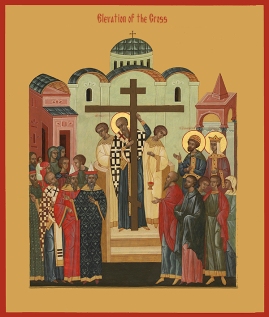 I think it is rather moving that the Feast of the Exaltation of the Holy Cross falls on a Friday this year. We fast every Friday throughout the year since every Friday is a memorial of Good Friday, just as every Sunday is a memorial of Easter Sunday. So it is that we honor and exalt the cross of our Lord on “the day” of His crucifixion. This should make us all the more aware of what took place on that cross and praise our Lord for opening the door to salvation for us. “Joy to you, life-bearing Cross of the Lord, invincible triumph of the true faith. You are the gate to Paradise, the strength of the faithful, and the stronghold of the Church. Because of you, corruption no longer has meaning nor power. By you we have been lifted up from earth to heaven. You are an invincible weapon against evil, a glory indeed for saints and martyrs, and a haven for salvation. You are the source of mercy to the world.” (Vespers, Aposticha for the Feast)
I think it is rather moving that the Feast of the Exaltation of the Holy Cross falls on a Friday this year. We fast every Friday throughout the year since every Friday is a memorial of Good Friday, just as every Sunday is a memorial of Easter Sunday. So it is that we honor and exalt the cross of our Lord on “the day” of His crucifixion. This should make us all the more aware of what took place on that cross and praise our Lord for opening the door to salvation for us. “Joy to you, life-bearing Cross of the Lord, invincible triumph of the true faith. You are the gate to Paradise, the strength of the faithful, and the stronghold of the Church. Because of you, corruption no longer has meaning nor power. By you we have been lifted up from earth to heaven. You are an invincible weapon against evil, a glory indeed for saints and martyrs, and a haven for salvation. You are the source of mercy to the world.” (Vespers, Aposticha for the Feast)
Our services for this feast bring home the fact that, although we are celebrating the discovery of the True Cross by St. Helena, we are really celebrating the salvation that comes through that cross. “O most venerable Cross of the Lord, the angels surround you with joy at your elevation today. You raise up those who had fallen and had been delivered from death for having eaten of the forbidden tree. Therefore, we praise you with our lips, begging for sanctification, saying: Exalt Christ our gracious God, O you nations, and adore His divine footsteps forever.” (Vespers, “At Psalm 140”). We are also presented with the Cross as the Tree of Life in juxtaposition of the Tree of the Knowledge of Good and Evil. In Genesis 2:9 it is written: “Also, in the middle of the garden were the tree of life and the tree of learning the knowledge of good and evil.” Verse 17 relates that God says to Adam, “…but from the tree of the knowledge of good and evil you may not eat; for in whatever day you eat from it, you shall die by death.” Instead of eating of the Tree of Life, Adam and Eve sinned by preferring the knowledge of good and evil over life itself. In verses 22 and 23, God says: “Behold, the man has become like one of Us, to know good and evil. Now, lest he put out his hand and take also of the tree of life, and eat, and live forever—” “therefore the Lord God sent him out of the garden of pleasure….” In contrast then, we see that the Tree of the Cross, through which we receive forgiveness, salvation, and eternal life, is the same as the tree of life in the garden. And it is through the voluntary death of Christ on the Cross that He conquers sin, corruption and death, and gives to those who believe that everlasting life that was denied us in the garden. It brings sharper focus the words recorded for us between the one criminal and Jesus as they hung on their crosses: “Then he said to Jesus, ‘Lord, remember me when You come into Your kingdom.’ And Jesus said to him, ‘Assuredly, I say to you, today you will be with Me in Paradise.’” (Luke 23:42-43). Through his act of repentance and prayer to our Lord, the Cross of Christ became his gate to salvation! And so it is with us who believe. If we ask for forgiveness and repent, the Cross becomes our gate to Paradise.
With all this, the Feast of the Exaltation of the Cross should take on a deeper meaning. At our liturgies for the feast, the priest, in imitation of the Patriarch of Jerusalem, elevates the cross and blesses the four corners of the earth, consecrating the whole world to God. When we see this elevation take place, it should strike such awe in our hearts that we rededicate ourselves to following Christ, receive the blessing given to us by the cross, and allow Him to strip off the gown of sinfulness and garb us with the gown of righteousness. “We bow to Your Cross, O Lord, and we glorify Your holy resurrection.” “Save Your people, O Lord, and bless Your inheritance; grant victory to Your Church over her enemies and protect Your people by Your Cross.”